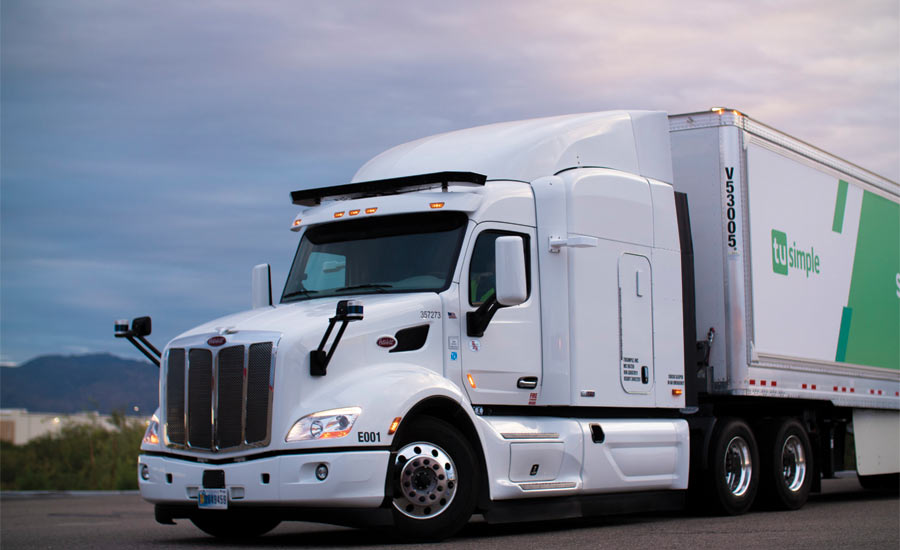
If you talk to anyone in Silicon Valley, you’d think that self-driving vehicles would be dominating the streets by next week. Sure, we’re seeing plenty of automated guided vehicles (AGVs) replacing some forklifts and walkie riders in beverage warehouses across the country, but when it comes to road-worthy equipment outside the four walls of the distribution center, any meaningful deployment — especially in the beverage direct-store-delivery (DSD) space — is still many years in the future.
Still, the technology is developing rapidly and the future could be here before we know it.
In its recent report titled “Self-Driving Truck Market by Level of Autonomy and Industry Vertical: Global Opportunity Analysis and Industry Forecast, 2020-2025,” Allied Market Research estimates that the global self-driving truck market is valued at just more than $1 billion. The Portland, Ore.-based company projects that, five years from now, that value will increase to nearly $1.7 billion — a projected compound annual growth rate (CAGR) of 10.4 percent through 2025.
The Allied study found that such factors as rising environmental concerns and increasing road accidents are driving the growth of the global self-driving truck market. Likely to hinder further growth of the technology are automation-related security concerns.
Allied Market Research also notes that North America is a dominant market for self-driving trucks, though the Asia-Pacific market is expected to exhibit the highest CAGR during the next five years. The factors that are driving growth in North America, the researcher says, include an increase in demand for artificial intelligence, the growing presence of the Internet of Things, and the growth of high-end infrastructure.
A North American milestone for self-driving truck technology within the consumer packaged goods industry occurred last fall with the first autonomous coast-to-coast freight run. The truck, using a system developed by self-driving trucking technology provider Plus.ai, carried a fully refrigerated truckload of Land O’Lakes butter 2,800 miles from Tulare, Calif., to Quakertown, Pa., in fewer than three days. The vehicle operated primarily in autonomous mode, with a safety driver on board to monitor the journey and take control if needed. A safety engineer also was on board to keep an eye on system operations.
The autonomous vehicle traversed a variety of terrain — from the plains of Kansas to the mountainous roads of the Rockies — through a range of weather conditions as it continued on its nearly 3,000-mile trip on Interstates 15 and 70, encompassing four time zones. The truck climbed elevations as high as 11,000 feet on its way to its ultimate destination.
Plus.ai, based in Silicon Valley with R&D operations in China, will be able to further enhance its vehicles’ performance in extreme weather conditions through a partnership it forged, also last fall, with the Minnesota Department of Transportation (MnDOT). The partnership includes information sharing between the two entities, related to the vehicles’ performance in treacherous winter road conditions. It’s MnDOT’s first partnership with an autonomous trucking company to test at the agency’s MnRoad cold-weather pavement testing facility. Testing will allow Plus.ai to better understand how weather conditions affect the movement of its vehicles.
Another major player in the autonomous space, San Diego-based TuSimple, last month kicked off a partnership with automotive component maker ZF to develop and commercialize technology for autonomous trucks. The two companies will co-develop production-quality technologies including cameras, Light Detection and Ranging (LiDAR), radar, steering and ZF’s automotive-grade central computer, ZF ProAl. In turn, ZF will support TuSimple’s pre-production driverless autonomous system and, ultimately, will serve as the supplier of choice for the company’s production-ready system for commercialized vehicles. Through the partnership, ZF will provide engineering support to validate and integrate TuSimple’s system into the vehicle. Last year, TuSimple announced it was working with Cummins to enable powertrain integration with TuSimple’s autonomous technology.
TuSimple already operates a fleet of more than 40 autonomous trucks. At last year’s edition of CES, the annual trade show organized by the Consumer Technology Association, TuSimple showcased a Navistar LT self-driving truck, demonstrating the TuSimple self-driving system.
TuSimple says the ongoing driver shortage — which is expected to hit 175,000 by the end of 2024 — is creating an opportunity for autonomous trucking, as average turnover a year is nearly 100 percent, it says. Further, Allied Market Research found that self-driving trucks are able to deliver loads more efficiently, as well as minimize delays and fuel use. The company also cites a PriceWaterhouseCoopers study that projects that autonomous vehicles will reduce operating costs on traditional trucking by 28 percent in 2025. That figure relates primarily to long-haul operations and it remains to be seen — based on technological developments, economic factors and rate of adoption — what that will mean for local DSD.
Title: Autonomous vehicle technology companies ramp up development for fleets
Sourced From: www.bevindustry.com/articles/93088
Published Date: 05/05/20

No comments:
Post a Comment